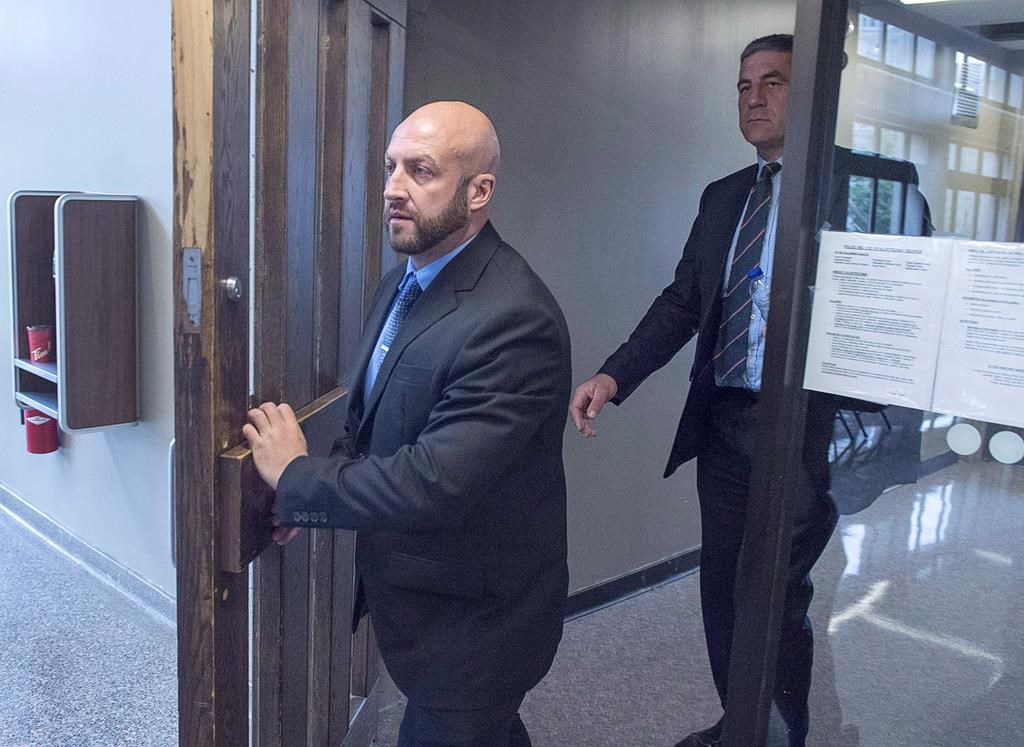The credibility of a woman who alleges she was gang raped at a Halifax-area military base was undermined by inconsistencies in her testimony, the lawyer for an accused British sailor told Nova Scotia Supreme Court on Thursday.

In his final submissions at the conclusion of a high-profile trial, lawyer Ian Hutchison said the woman’s testimony contrasted sharply with what every witness had to say about her behaviour on the night in question: April 9-10, 2015.
“All of the witnesses who have testified before this court … have provided contradictory evidence,” Hutchison told the court.
However, Crown lawyers rejected that view, arguing the defence had largely relied on rape myths to bolster its case.
READ MORE: Alleged comments of woman who says she was gang raped admitted as evidence at Halifax trial
British sailor Darren Smalley, 38, is charged with sexual assault causing bodily harm and participating in a sexual assault involving one or more people. He was one of four British sailors originally charged.
Smalley was part of a Royal Navy hockey team that was in Halifax to compete in a tournament.
The woman, whose identity is protected by a publication ban, testified last month she was at the Warrior Block barracks at 12 Wing Shearwater because her friend had invited her on a double date after meeting a British sailor on Tinder.
The woman testified she went to sleep next to British sailor Simon Radford on April 10, 2015, and later awoke face down and naked as at least three men sexually assaulted her.
She later told police she couldn’t see the men, but she was able to identify Smalley’s voice.
Swabs taken by a sexual assault nurse confirmed that semen found near her anus and on her underwear matched Smalley’s DNA profile. The nurse also found bruising on the woman’s shoulder, leg and groin area, and lacerations to her genitals and anal area.
The complainant testified that she became fearful earlier in the evening after she lost sight of her friend, but she said she was too terrified to leave the barracks. She recalled being frantic in the unfamiliar building, which was filled with men.
However, Hutchison said every witness, including the woman’s best friend, told the court the complainant appeared happy and comfortable in her surroundings.
“Despite having this fear of being in an unsafe environment, she consumes alcohol and gets into bed with Mr. Radford,” he told the court.
The woman also told the court she had lost consciousness three times during the alleged assault, but Hutchison said that didn’t make sense because the woman hadn’t had much to drink and there was no evidence she had been drugged.
As well, Hutchison noted the woman gave Radford a kiss on the lips when she got into his bed, which she said was a way of saying thank you for keeping her safe.
“One may ask, ‘Why isn’t ‘thank you’ good enough?”‘ Hutchison said.
Crown lawyer Cheryl Schurman said it was wrong to infer that the kiss was important to the case.
“It does not mean she consented to group sex,” Schurman said. “The kiss is a red herring.”
Schurman also argued that the woman’s outward behaviour was not necessarily inconsistent with how she was feeling inside.
It was clear that the woman was in an unfamiliar place, where a large group of men were in a rowdy mood, she said. Rather than show her fear, the woman hid her emotions and tried to appear in control to protect herself, Schurman said.
“She tried to socialize to survive an uncomfortable situation,” the attorney said. “The fact that she hid that fear is not unreasonable.”
Schurman said the idea that the woman had a “duty to flee” the barracks should be understood as a rape myth.
“Regardless of how uneasy she was, she was under no obligation to flee,” Schurman told the court.
Crown lawyer Eric Taylor stressed there was no evidence the woman consented to sexual activity with anyone. Smalley did not testify at the judge-only trial.
Taylor also said the woman had no motive to lie about what happened, saying it was clear from her testimony, and that of her best friend, that both were not embarrassed by the prospect of having consensual sex at the barracks.
Taylor cited another rape myth, saying there remain stereotyped assumptions that women who consent to sex “they are not supposed to have” must be considered untrustworthy.
He said that kind of “faulty sexist reasoning” was unfair, saying it wouldn’t make sense for the woman to offer graphic details of what happened to her if she was embarrassed by consenting to group sex.
“Why these details?” Taylor said. “They have a ring of truth to them.”
The charges against Radford were stayed earlier in the trial because he was being treated in hospital for an infection. The charges can be reinstituted within one year. The charges against the other two men were dropped.
Justice Patrick Duncan said he would deliver his decision Jan. 17.




Comments